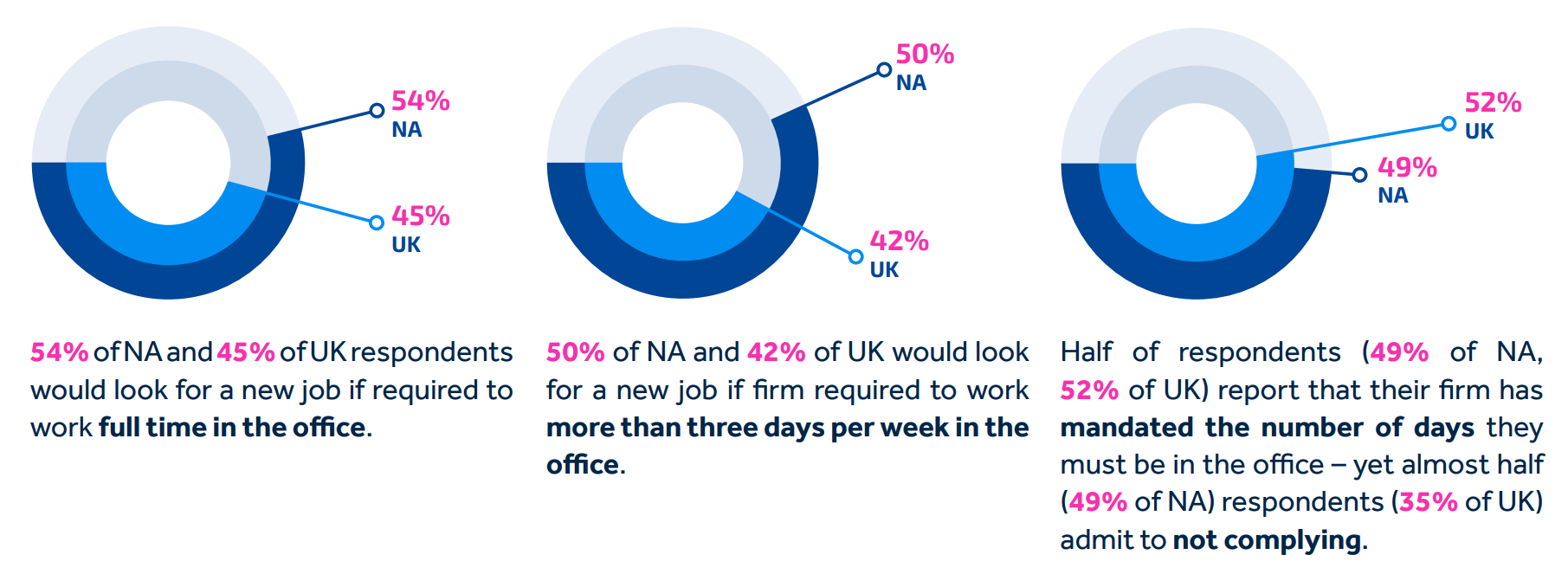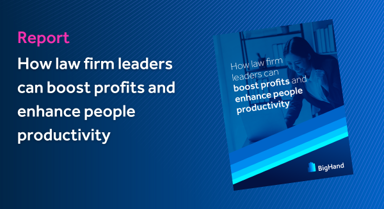Law firms – indeed all professional services firms – are grappling with the need to define and implement a hybrid working culture that meets very diverse needs. Two years spent working from home (WFH) have reminded people of the importance of a better work life balance. As management push for employees to return to the office for a set number of days per week, employee resistance is growing and firms across the board are being advised not to force employees to return to the office.
Within the legal sector, hybrid working is now firmly established, adopted by 100% of NA and 99% of UK firms. Of these, 85% of NA and 87% of UK respondents said this is a permanent change. However, there is not a one size fits all approach: both firms and employees have different attitudes and expectations. Currently, most lawyers are working away from the office three days (39% of NA, 41% of UK). Unrest is brewing, however, often due to inconsistencies in the design and application of these hybrid working policies.

Half of respondents (49% of NA, 52% of UK) report that their firm has mandated the number of days they must be in the office – yet almost half (49%) of NA respondents admit to not complying with the hybrid working policies and 55% want more flexibility in their working environment. Compliance in the UK is higher (62%), but a greater number (62%) want more flexibility within their working environment. Instead, employees feel pressure from management to work in the office (43% of NA and 42% of UK).
Given the demand for skilled legal employees and steeply rising employment costs, law firms should be genuinely concerned to understand the extent of employees’ commitment to achieving a flexible working model that meets their needs. Employees will quit if compelled to spend more time in the office. 55% of NA and 45% of UK would look for a new job if their firm required them to work full time in the office. 57% NA and 42% of UK would look for a new job if their firm required them to work more than three days in the office.
Productivity Concerns
More employers are reporting that hybrid working supports productivity; indeed, two-thirds (67 per cent) of lawyers said that remote working is just as productive as being in the office. Employees, however, are aware of the difficulties that can be created by a dispersed workforce – not least lawyers undertaking more administrative work rather than delegating to a more appropriate resource (43% NA, 37% UK).
Ensuring an even distribution of work between lawyers is a challenge (39% of NA, 45% of UK) – with respondents flagging the issue of lawyers having little understanding of how to allocate work to the best available resource (36% of NA, 33% of UK). Worryingly, this issue has increased since last year’s report – 29% of NA, 26% of UK. Without robust processes for resource allocation, a hybrid working model can quickly lead lawyers to fall back into old habits. Can firms afford for work to be delegated to the same set of associates rather than following a holistic approach that ensures the right skills and expertise are deployed on every matter? Are they even aware off the impact on morale and retention when work is not allocated fairly among associates?
With little visibility of the type of work being delegated (31% of NA, 33% of UK) and little visibility of capacity/utilisation of employees (35% of NA, 31% of UK) it will be extremely difficult for firms to assess the impact of hybrid working on the business. Again, this challenge has increased year on year – in 2021 it was 29% of NA, 28% of UK. How will firms ensure the right work is going to the right level of resource? Check that expensive associates are not compelled to complete low-value work that will not only dent profitability but also, potentially, morale? Or ensure that career development is equitable, with fair access to career enhancing work?

With respondents also recognising that hybrid working increases the difficulty of recruiting and retaining lawyers (38% of NA, 36% of UK), it is imperative for firms to ensure they have better resource management visibility and control if hybrid working is to be productive for the business and meet lawyers’ expectations.
Avoid Hybrid Working Inconsistencies
A lack of consistent policy is divisive. Evidence is building of a large and growing disconnect between work flexibility for non-executive and executive employees – with junior lawyers more than two times more likely than senior to be asked to come to the office. Within the legal sector, while most lawyers are in favor of a hybrid working model, which would see workers come into their offices for at least one day a week, differences emerge between senior men working in law firms, and women, juniors, and general counsels. Men working as partners in law firms were significantly more likely to want to come back into offices, compared to women and more junior colleagues working at the same firms.
Furthermore, 65% of NA and 59% of UK respondents say their firm has different hybrid working policies for lawyers or partners and support staff. With up to five generations of employees in many firms, it is vital to understand and manage their different needs and expectations. With partners in law firms almost twice as likely (60%) to agree with their firms’ WFH policies, they are significantly better aligned with their thinking than associates (34%), clearly, the current model is not working for everyone.
Why are firms failing to understand employee commitment to and preference for a hybrid working model that truly reflects their needs? Imposing demands on employees is rarely a recipe for success, so why are firms so focused on enforcing hybrid working policies and trying to get employees to adhere to set days in the office?
At a time of significant shortage of talent and escalating salaries, an appropriate and consistent approach to hybrid working is becoming a fundamental component of employee retention. By creating a working environment that truly reflects employee demands – and they are without a doubt in a position to make more demands – firms will be in a far stronger position to boost retention and improve compliance with hybrid working thereby improving client delivery.
This was an excerpt from the report 'Legal Resource Management - The Present and Future Impact on Law Firms'. Access the full report to dive deeper into the findings from over 800 legal management professionals:







